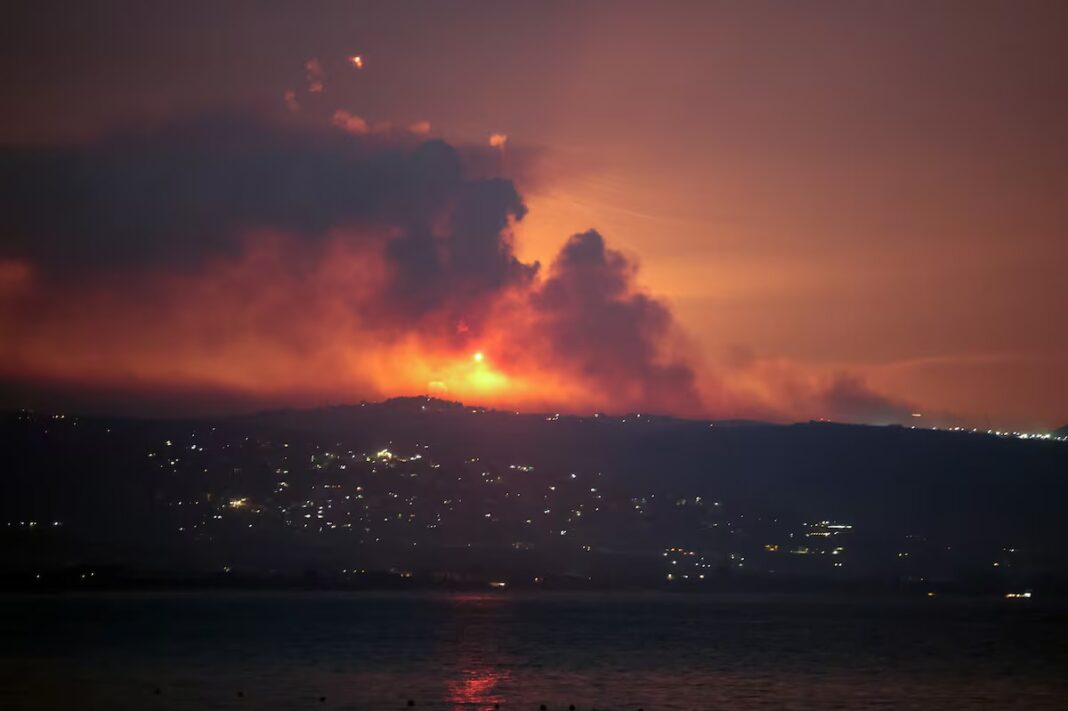On Sunday, Hezbollah launched hundreds of rockets and drones towards Israel, escalating tensions in the region. The attack was a direct retaliation for the assassination of Fuad Shukr, a senior Hezbollah commander, in Beirut last month.
A Preemptive Strike by Israel
Israeli aircraft hit locations in southern Lebanon before to the onslaught from Hezbollah. Israel’s military moved quickly as it became apparent that Hezbollah was getting ready for a significant assault. According to Israeli officials, the strikes were carried out to stop an impending threat to Israeli civilians.
“We have conducted precise strikes in Lebanon to thwart an imminent threat,” declared Yoav Gallant, the minister of defense. He made it clear that Israel will do all it takes to save its people and is committed to defending itself.
Hezbollah’s Response: Over 320 Rockets Launched
Hezbollah acknowledged that it had struck Israel with around 320 Katyusha rockets, aiming for 11 military installations. They referred to this as the “first phase” of their reaction to Shukr’s murder. The group cautioned that it might take some time to respond fully.
In northern Israel, air raid sirens blared as the Iron Dome defense system intercepted multiple rockets. No immediate casualties were reported in Israel, but the situation remains tense.
Emergency Measures in Israel
In response to the escalation, Gallant declared a state of emergency. Flights to and from Ben Gurion Airport in Tel Aviv were briefly suspended, and civil defense instructions were issued across central and northern Israel. People were advised to stay close to air raid shelters. Magen David Adom, Israel’s national ambulance service, went on high alert nationwide, preparing for potential casualties.
Intensifying Conflict in Southern Lebanon
The situation in southern Lebanon also deteriorated rapidly. A Lebanese security source reported that at least 40 Israeli strikes had hit various towns in one of the densest bombardments since the conflict began in October. A resident of Zibqeen, a town near the Israel-Lebanon border, described waking up to the sounds of planes and explosions, saying, “It felt like the apocalypse.”
Israeli military sources claimed that the military deployed around 100 jets to prevent a planned Hezbollah missile attack on central Israel. They believe Hezbollah hastily organized the barrage that followed in response to the preemptive strikes.
Fears of a Broader Regional Conflict
The escalation between Israel and Hezbollah has heightened fears of a wider regional conflict. With both the United States and Iran involved, the stakes are high. President Joe Biden is closely monitoring the situation, with senior U.S. officials in constant communication with their Israeli counterparts.
The White House reaffirmed its support for Israel’s right to defend itself, while also stressing the importance of regional stability. “We will keep working for regional stability,” said Sean Savett, a spokesperson for the U.S. National Security Council.
Ongoing Negotiations Amidst Conflict
As the conflict rages on, negotiators are meeting in Cairo in a last-ditch effort to halt the fighting in Gaza. The discussions focus on a potential exchange of hostages for Palestinian prisoners.
Hezbollah’s actions followed a series of events that began with the Oct. 7 attacks by Hamas on Israel. Although both sides have been exchanging fire since then, a major escalation had been avoided until now.
The situation took a turn after the missile strike in the Israeli-occupied Golan Heights, which killed 12 youngsters. Israel blamed Hezbollah, though the group denied involvement. The assassination of Fuad Shukr in Beirut, followed by that of Hamas leader Ismail Haniyeh in Tehran, has further fueled tensions. With both sides preparing for further action, the region remains on edge, with the potential for a larger conflict looming.

